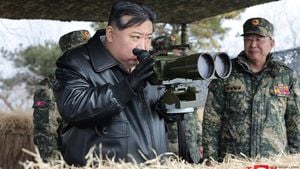The latest escalation between Israel and Hezbollah has transformed the already tense situation along the Israel-Lebanon border, marking the most severe confrontation since the October outbreak of conflict sparked by Hamas's actions from Gaza.
On the evening of September 27, Israel executed extensive air strikes on Hezbollah's primary headquarters located within the densely populated Haret Hreik neighborhood of southern Beirut. The fierce bombardment, which reduced multiple buildings to rubble, sent towering clouds of smoke billowing above the city, indicating the scale of devastation. Initial reports from Lebanese health authorities noted at least six fatalities and injures to 91 others—numbers projected to rise significantly as rescue efforts continue amid the chaos.
Eyewitness accounts describe the situation as harrowing. "It’s been a long night of violence with nearly continuous Israeli attacks targeting neighborhoods within Beirut’s southern suburbs," reported Al Jazeera’s Zeina Khodr, who has been covering the escalation closely. People started fleeing the area as the blasts shook windows as far as 30 kilometers away from the site of the attacks.
According to Israeli military representatives, the strikes were aimed at dismantling what they described as Hezbollah's central command embedded under residential buildings. Past weeks had seen similar, though less intense, operations, but the scale and impact of this latest offensive were unlike anything observed recently. This was particularly disheartening for local residents who had hoped for some respite.
Lebanon's Prime Minister, Najib Mikati, condemned Israel's actions as blatant disregard for international calls for restraint, labeling the strikes as evidence of Israel's indifference to the humanitarian crisis developing within Lebanon.
Friday's strike did not occur without foreboding. Earlier, Israeli Prime Minister Benjamin Netanyahu had returned from his address to the United Nations General Assembly, pledging to persist with military operations against both Hezbollah and Hamas until victory is achieved. Analysts on the ground indicated the timing of the attack seemed like part of Netanyahu's broader strategy to display military strength and counter potential threats from the Iranian-aligned group.
It's worth noting the severity of this latest confrontation has been compounded by claims and counterclaims. On September 28, the Israeli Defense Forces reported intercepting missiles fired from Lebanon, triggering concerns of a wider conflict. Such tensions have resulted in casualties on both sides, as thousands of Lebanese continue to be displaced from their residences, seeking safety from the aerial bombardments.
This escalation signals more than just the continuation of hostilities from either side. Defense experts suggest it is reflective of changing dynamics and growing boldness within Israeli military strategies, which aim to neutralize perceived threats by taking aggressive actions against high-ranking members of Hezbollah. The ramifications could be massive, potentially drawing other regional powers, such as Iran, more directly onto the geopolitical stage, particularly if Tehran perceives the strikes as direct aggression against its interests.
Iran has condemned the Israeli strikes, asserting through its embassy in Lebanon, the attacks mark a "serious escalation" and vowing appropriate punishment will be meted out for the assault. This response highlights the precarious balance of power and the potential for the conflict to spill over, igniting broader regional tensions.
Within the complexity of this situation, both analysts and citizens wonder whether Israel’s recent military offensive is merely defensive or indicative of plans for far broader and perhaps riskier actions against Hezbollah and its allied forces. Conflicts have been deepening ever since Hezbollah began launching retaliatory strikes aimed at Israel after the war began on Palestinian territories.
Notably, attempts at mediation have also been apparent, with discussions led by U.S. and French diplomats aimed at establishing ceasefires or de-escalation agreements. Yet, the Israeli air strikes appear to undermine these diplomatic avenues, complicity raising doubts about whether Israel genuinely seeks negotiation and peace or is laying groundwork for more extensive military confrontation.
Further complicate this scenario are rumors and speculation about potential plans for assaults aimed directly at Iranian leadership or interests, positioning this conflict not just as Israel versus Hezbollah, but as part of the larger narrative between Iran and its regional adversaries. The recent air strike's timing and location certainly suggest broader strategic goals at play for Israeli military operations.
There has been discontent voiced across many sectors, with citizens, humanitarian organizations, and international observers demanding intervention and de-escalation. The situation remains incredibly fluid—with each attack intensifying fears—both regionally and globally.
Reflecting on the tumultuous events during the past weekend, local residents described scenes of chaos and despair, many reporting they have no immediate shelter amid the destruction. The narrative is clear: the existing tensions have transformed, leading to what many are calling the most serious escalation of the Israel-Hezbollah conflict since it reawakened.
Analysts remain alert to the ripple effects these escalations might have beyond Lebanon, as increased cross-border conflict demonstrates the volatility of the region. Observers now question what lies on the horizon. Could this lead to wider conflict, or can diplomatic efforts somehow salvage peace? The world watches closely as the next moves from both Israel and Hezbollah remain uncertain. Meanwhile, families and lives hang precariously as air raids and military strikes continue to rattle their existence.
This violent escalation not only poses immediate threats to civilians but raises complex questions as to how the region can navigate back from the brink of what some fear could be an all-out war.



